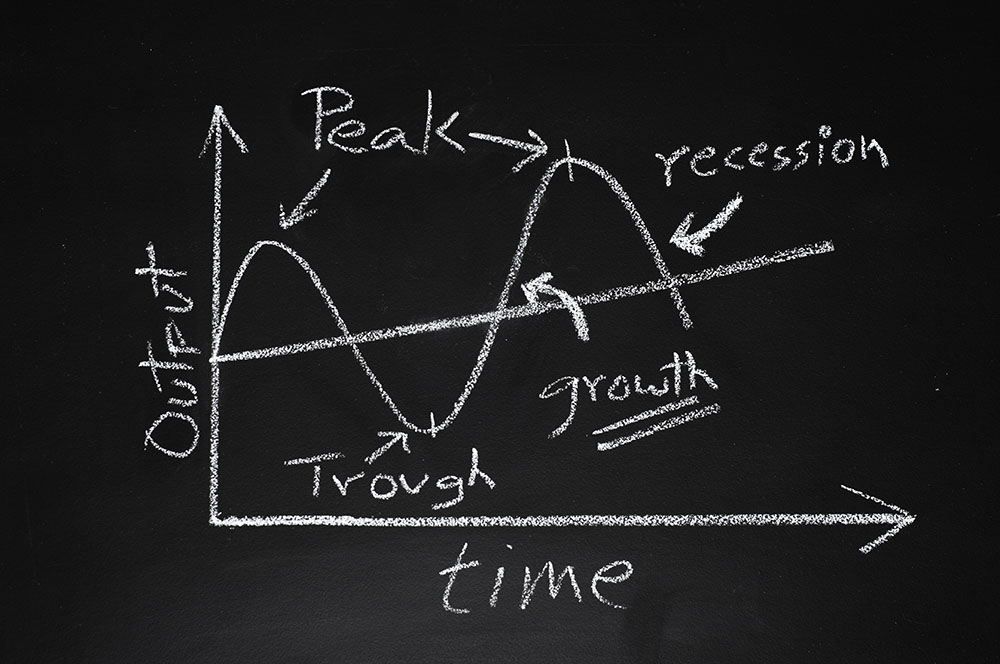It’s easy to lead when conditions are great. Business is booming, salaries are competitive, and bonuses are generous. Executives praise their teams, and a winning attitude permeates the culture.
But those who understand the cyclical nature of business know that peaks are often followed by valleys. Inevitably, soaring profits come back down to earth and businesses change course in response.
How do you prepare for economic downturns and market instability as a leader? First, recognize that how you manage in challenging times is the true measure of your leadership ability.
If you are aware that challenging conditions throw off your equilibrium, there is no better time to prepare for difficulties than before they appear.
Your character is tested in moments of discomfort and uncertainty. I’ve spoken before about the essential nature of congruence for leaders: Do you act the same way in good times and in bad times? If you are aware that challenging conditions throw off your equilibrium, there is no better time to prepare for difficulties than before they appear.
I recently worked client who is experienced a change in business conditions. These changes have made it tough to achieve business goals. Instead of focusing on the negative external forces on the company’s performance, the executive team chose to reaffirm organizational commitment to its core values and the behaviors that will continue to build trust, create psychological safety, and engage its workforce through this period of change. How did they do this?
They started by conducting an engagement survey to understand demographic or functional areas that may not be as engaged as others. Using that data, the executive team developed ways to better connect with those groups to ensure they feel connected and valued. The executive team, in partnership with HR, then arranged leadership sessions with speakers who have highlighted and reframed company core values in new and different ways to ensure the right behaviors are supported. The company is also recommitting to the IDP (individual development plan) process to ensure that leaders are being developed in equitable ways that meet their unique needs and supports the accomplishment of business goals.
Achievement during downturns is no less important than big wins during better times.
Each organization is unique and approaches to challenges differ based on culture and circumstances. But some practices have universal benefits. I prepare executives to support and guide their teams with grace when transitioning into tougher times:
- Practice Gratitude. Appreciation of the great aspects of your business and highly successful efforts can carry you through the leaner times. Knowing that you accomplished greatness before reassures you and your teams that you will once again. Take nothing for granted and continue to share the stories of organizational accomplishments; they are forever moments to celebrate.
- Redefine Winning. Goals may look different in more challenging conditions. But achievement during downturns is no less important than big wins during better times. But while the milestones may be smaller, take the time to acknowledge and amplify reaching them. Organizational celebration is essential for positive morale. You can still win, adjusting for the current factors that impact the business.
- Coach Consistently. At all times, positive and constructive feedback are necessary aspects of your management relationship with team members. While tough economic times may pull your focus to larger company issues, people still take priority. Change and lack of clarity affect us all, to different degrees. When employees understand how they are doing and their importance to the larger organization’s vision, they are better equipped to perform and succeed.
- Manage Your Stress. When you’re not sleeping, your ability to demonstrate high EQ, or emotional intelligence, is lowered significantly. If you’re holding a lot of tension in your body, it may manifest in a variety of negative ways. Find ways to reduce and manage stress, calendaring exercise, rest, and activities you find enjoyable. Taking care of you helps you take care of others.
- Reinforce Core Values. When you adhere closely to your organizational core values, you find the “right thing” to do more easily. Living the values more closely in difficult times helps you keep your cool when temperatures increase, figurately, and possibly literally. With clear guidance in the way your company wants to operate in the world, decision-making becomes easier, and you can move forward with purpose.
- Listen with Intent. When low-hanging fruit has already been picked, it’s time to search harder and smarter for what comes next. Take the time to listen to employees about their ideas, fears, and thoughts. Observe, test processes, and be open to opportunities you may miss if you’re rushing interactions.
When leaders evaluate how decisions impact the bottom line, they also must keep the impact on people at the forefront.
The turbulence and uncertainty that surrounded the arrival of COVID-19 was a shock to many leaders. Predictable business cycles were blown far off course. And just when companies had adjusted to “new normal” operations, rising interest rates, inflation, and skyrocketing prices have forced several of the organizations I work with to modify or change their outlook. They have slowed or stopped hiring or are considering the need for layoffs if the economy worsens. When leaders evaluate how all of these decisions impact the bottom line, they also must keep the impact on people at the forefront.
In my counsel to the leaders whom I coach, I advocate for a “people first” approach. This involves becoming more intentional in interactions with colleagues and direct reports — empowering, engaging, coaching, and leading their teams to succeed. An ideal example of this in the current climate is examining how a leader reacts to receiving bad news. Leaders are often the last to hear negative reports because those within their orbit have seen their responses and don’t want to experience them again. I help leaders reframe these “bad news moments” as a way to get the most current information about their business units and an opportunity to solve problems with their teams.
Good leaders listen to bad news, along with possible solutions from those closest to the work.
Great leaders use the solutions from their team and allow them to execute the work.
Exceptional leaders will also coach those they lead to higher levels of performance, especially during tough economic times.
Bad news may be a litmus test for how a leader acts under pressure, but it certainly isn’t the only stressful situation today’s management-level executives face. The question a leader should ask themselves is this:
If I were a more junior associate, am I the leader I’d choose to guide me through the toughest time my business has seen? If the answer is no or you’re unsure, it’s time to recalibrate and determine how a “people first” mentality could transform your team.








